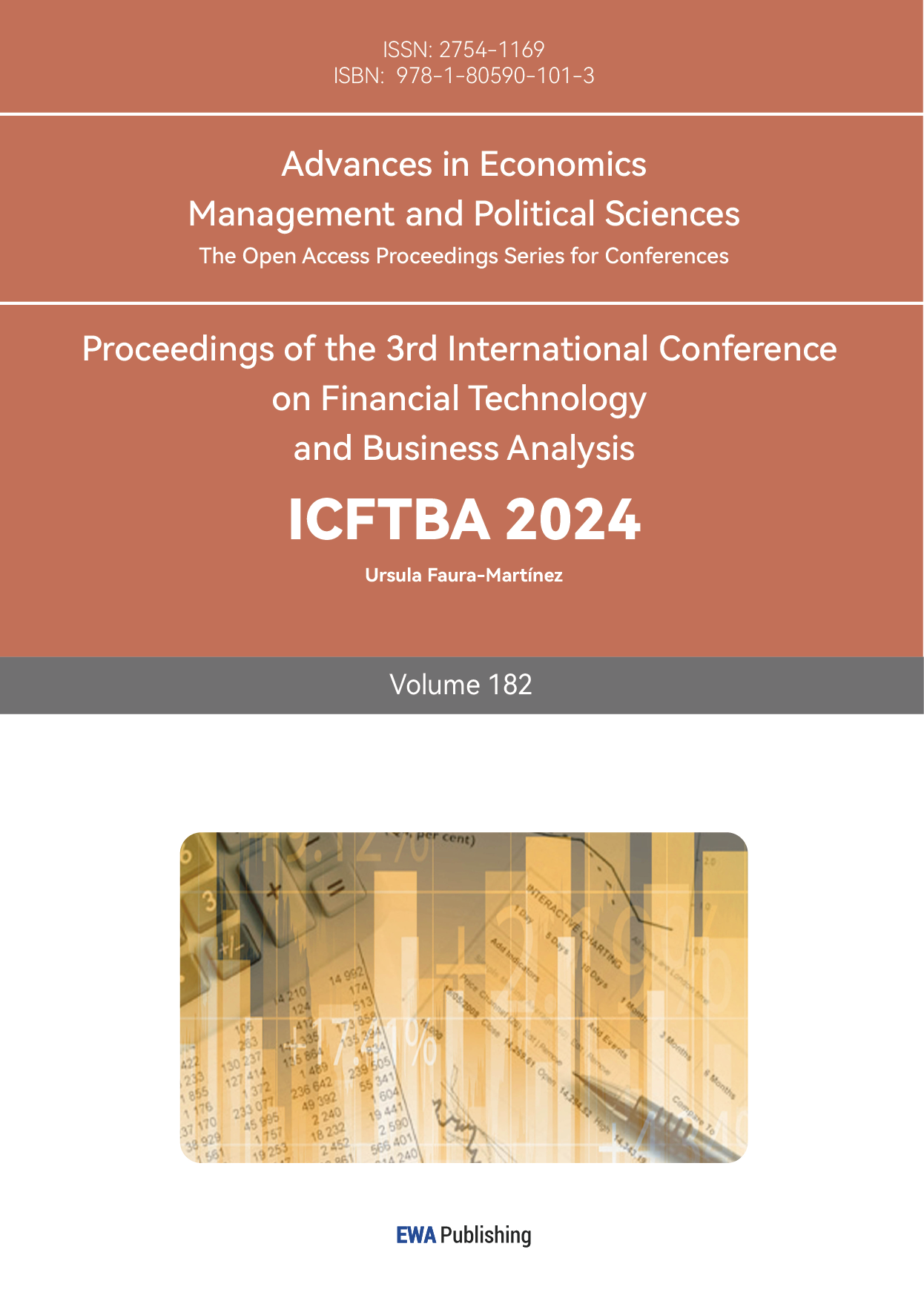References
[1]. Chetna Dikkar (2021) Unisex Clothing, A Sustain Ale Way of Self Expression, International Journal of Textile and Fashion Technology · January 2021 DOI: 10.24247/ijtftapr20212
[2]. Li Yuejiao, Li Jiayi (2023) Boundary and Breakthrough: Research on display design of non-sexist fashion culture, Art Science and Technology, No.3, 2023, 34-36
[3]. Namrata Sandhu'(2017) Consumer Response to Brand Gender Bending: An Integrated Review and Future Research Agenda, Business Perspectives and Research5(2) 151-166© 2017K.J. Somaiya Institute of Management Studies and Research SAGE Publicationssagepub. in/home.nav DOI: 10.1177/2278533717692917
[4]. Sarif PATWARY (2020) Clothing and Textile Sustainability: Current State of Environmental Challenges and the Ways Forward, scientific review UDC 687:677:502.131.1 DOI: 10.31881/TLR.2020.16
[5]. Wang Xiaoran, Zhao Shuping (2019) Nearly 70% of the “post-90s” pay attention to the cost performance of goods https://m.sohu.com/a/320395950_115865
[6]. National Health Network (2024) How many thousands of homosexuals are there in this country? How many gay people make up the total population in our country? https://www.qm120.com/zt/bake/786723.html
[7]. NetEase News (2024) New research shows that nearly half of Chinese people approve of LGBT people, and family acceptance and openness are key https://m.163.com/dy/article/J907CA1O052880KM.html
[8]. Wu Heqing (2014) Two-thirds of Chinese consider themselves enviromentalists, twice as many as in Europe and the United States https://www.chinanews.com.cn/gj/2014/05-09/6151228.shtml
[9]. Wu Heqing (2014) Two-thirds of Chinese consider themselves enviromentalists, twice as many as in Europe and the United States https://www.chinanews.com.cn/gj/2014/05-09/6151228.shtml
[10]. Hyojung Kim, Inho Cho and Minjung Park*, Analyzing genderless fashion trends of consumers’ perceptions on social media: using unstructured big data analysis through Latent Dirichlet Allocation‐based topic modeling
[11]. Hyojung Kim, Inho Cho and Minjung Park*, Analyzing genderless fashion trends of consumers’ perceptions on social media: using unstructured big data analysis through Latent Dirichlet Allocation‐based topic modeling
Cite this article
Hao,Y. (2025). The Method of Creating a Genderless and Environmentally Friendly Clothing Brand and Spreading Unisex and Environmentalism in China. Advances in Economics, Management and Political Sciences,182,66-71.
Data availability
The datasets used and/or analyzed during the current study will be available from the authors upon reasonable request.
Disclaimer/Publisher's Note
The statements, opinions and data contained in all publications are solely those of the individual author(s) and contributor(s) and not of EWA Publishing and/or the editor(s). EWA Publishing and/or the editor(s) disclaim responsibility for any injury to people or property resulting from any ideas, methods, instructions or products referred to in the content.
About volume
Volume title: Proceedings of the 3rd International Conference on Financial Technology and Business Analysis
© 2024 by the author(s). Licensee EWA Publishing, Oxford, UK. This article is an open access article distributed under the terms and
conditions of the Creative Commons Attribution (CC BY) license. Authors who
publish this series agree to the following terms:
1. Authors retain copyright and grant the series right of first publication with the work simultaneously licensed under a Creative Commons
Attribution License that allows others to share the work with an acknowledgment of the work's authorship and initial publication in this
series.
2. Authors are able to enter into separate, additional contractual arrangements for the non-exclusive distribution of the series's published
version of the work (e.g., post it to an institutional repository or publish it in a book), with an acknowledgment of its initial
publication in this series.
3. Authors are permitted and encouraged to post their work online (e.g., in institutional repositories or on their website) prior to and
during the submission process, as it can lead to productive exchanges, as well as earlier and greater citation of published work (See
Open access policy for details).
References
[1]. Chetna Dikkar (2021) Unisex Clothing, A Sustain Ale Way of Self Expression, International Journal of Textile and Fashion Technology · January 2021 DOI: 10.24247/ijtftapr20212
[2]. Li Yuejiao, Li Jiayi (2023) Boundary and Breakthrough: Research on display design of non-sexist fashion culture, Art Science and Technology, No.3, 2023, 34-36
[3]. Namrata Sandhu'(2017) Consumer Response to Brand Gender Bending: An Integrated Review and Future Research Agenda, Business Perspectives and Research5(2) 151-166© 2017K.J. Somaiya Institute of Management Studies and Research SAGE Publicationssagepub. in/home.nav DOI: 10.1177/2278533717692917
[4]. Sarif PATWARY (2020) Clothing and Textile Sustainability: Current State of Environmental Challenges and the Ways Forward, scientific review UDC 687:677:502.131.1 DOI: 10.31881/TLR.2020.16
[5]. Wang Xiaoran, Zhao Shuping (2019) Nearly 70% of the “post-90s” pay attention to the cost performance of goods https://m.sohu.com/a/320395950_115865
[6]. National Health Network (2024) How many thousands of homosexuals are there in this country? How many gay people make up the total population in our country? https://www.qm120.com/zt/bake/786723.html
[7]. NetEase News (2024) New research shows that nearly half of Chinese people approve of LGBT people, and family acceptance and openness are key https://m.163.com/dy/article/J907CA1O052880KM.html
[8]. Wu Heqing (2014) Two-thirds of Chinese consider themselves enviromentalists, twice as many as in Europe and the United States https://www.chinanews.com.cn/gj/2014/05-09/6151228.shtml
[9]. Wu Heqing (2014) Two-thirds of Chinese consider themselves enviromentalists, twice as many as in Europe and the United States https://www.chinanews.com.cn/gj/2014/05-09/6151228.shtml
[10]. Hyojung Kim, Inho Cho and Minjung Park*, Analyzing genderless fashion trends of consumers’ perceptions on social media: using unstructured big data analysis through Latent Dirichlet Allocation‐based topic modeling
[11]. Hyojung Kim, Inho Cho and Minjung Park*, Analyzing genderless fashion trends of consumers’ perceptions on social media: using unstructured big data analysis through Latent Dirichlet Allocation‐based topic modeling









